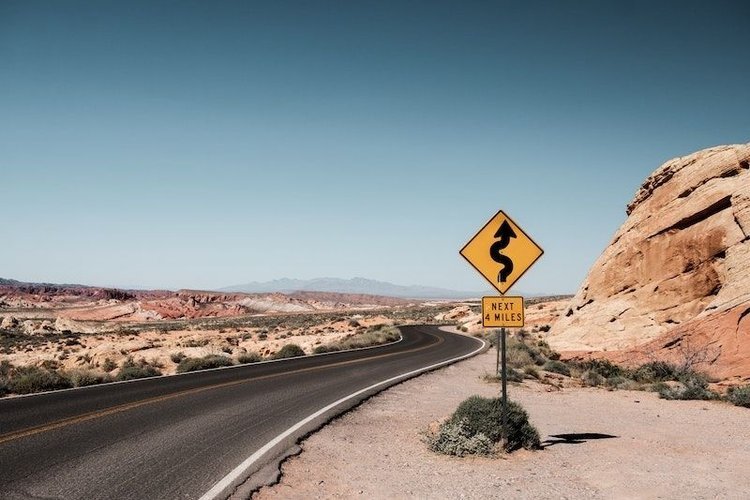WHAT’S AHEAD? OR RATHER, WHAT’S AROUND THE CORNER?
The future is…well…uncertain
Can we talk about that for a moment? Can we stop pretending we’re good and feel excited about the year ahead without acknowledging a moment of… I have no clue, but I have hopes and dreams.
We humans like to know what's coming. We like to be prepared. I know the new year brings commitment and focus, but it also brings uncertainty for most people. If that's you, it's ok; you are in touch with reality.
TO CHANGE OR NOT.
Change is a strange thing. We want change when we are the ones deciding on it because something isn’t working. Yet, when we find the change uncomfortable, we fall back into old patterns and habits.
It takes negotiating with our inner dialog before we can get ourselves to a place of embracing change. In other words, just saying we want change doesn’t make change possible. Instead, we must be super-mindful and focus on change with intention.
But in the real world, things change all the time, and most of it is out of our control. There's the kind of change that's a shock to the system because we often don't see it coming. It’s the life-altering kind of changes we've been seeing a lot of lately; COVID, lay-offs and loss.
There’s also the change we don’t talk much about, which causes a lot of stress. It’s the daily changes that make our day unpredictable and uncertain, leaving us feeling like we have no agency over our own time or our work.
Changed meetings, sudden needs, last-minute revisions, news that affect the market, clients who change their minds, managers who need something else than you thought they were asking for, mistakes that you discover right before starting a presentation, someone who gets sick and has to leave work, a child that needs its parent, an aging parent who just fell, and the daily challenges add up on top of what we already knew was the daily challenge to produce results and meet the deadline. Feedback we didn't expect and demands that feel impossible to meet.
Are you finding yourself holding your breath as you read this? This daily stress leaves many of us on high alert, which raises cortisol levels. This increases stress, anxiety, fear and self-doubt, leaving us stuck in what's not working, which is the pothole perspective that I talk about in my book.
Being in this state of high alert has become the new normal, and it’s getting us tired, isn’t it? People who encourage a positivity mindset argue that excitement is a similar feeling in the body but a different thought. It’s not entirely true. The hormones in your body and how your nervous system is activated are not the same between excitement and fear. Fear is cortisol and the lower survival-brain mindset that’s just trying to get out of trouble, which drains us and causes inflammation, which can lead to long-term fatigue and burnout. Excitement is dopamine and the smart brain firing up, which is where courage, confidence and constructive, creative problem-solving thinking happens. This is the part of the brain where we feel in charge, where we feel we have choice and agency.
SHIFTING FROM A FEAR-DRIVEN MINDSET TO A CARE-DRIVEN ONE.
Rethinking self-care means using the tools of The Self-Care Mindset® to help us navigate the constantly changing reality we are living in.
To shift from a fear-driven perspective to a CARE-driven (curiosity, acknowledgement, respect and empathy) mindset, we need to pause. By doing so, we can let the nervous system calm down and listen inside with curiosity to what the fear is telling us. We can use fear as information by acknowledging it and respecting ourselves for feeling this way instead of “man-handling” our emotions. Then, we can ask with self-empathy what we need so that we can move from a fear-driven mindset to a constructive, problem-solving one. It’s a process that starts with the choice to pause. The essential piece that many miss is that we cannot ignore our fear, but we can use it as information about what we need to navigate uncertainty. Ignoring it doesn’t make it go away; it makes us more insecure because our unconscious mind is pretty smart, and it knows when we are suppressing and ignoring key emotions.
To navigate and harness the uncertainty that life is, we need to learn to trust ourselves, not the road ahead.
We need to stop being fixers of what’s not working and instead start being problem solvers in a way that moves us forward, which means embracing change.
POWER-PAUSING.
To pause for a moment is essential to coming back home, to our bodies, to ourselves, to allow our nervous system to calm down so that our mind can re-center, re-focus, re-cover, re-claim agency and re-engage. To give ourselves the space to pause, listen and ask, what's the outcome that would be most meaningful in this situation, and what do I need right now so that I can achieve that?
In today’s changing reality, it’s not how hard we work that gets results; it’s how well we think that creates solutions that produce results based on the problems we face. It's how we slow down our mind and solve the right problem. The one that helps us face the uncertainty with courage and confidence.
That's just one of the reasons why self-care is not the goal. It’s how we work better so that we reach our goals without burning out.


